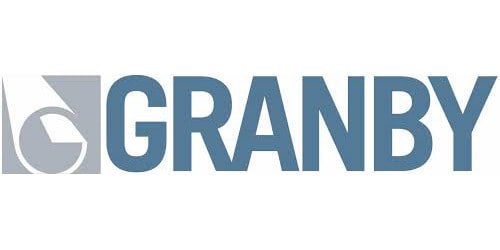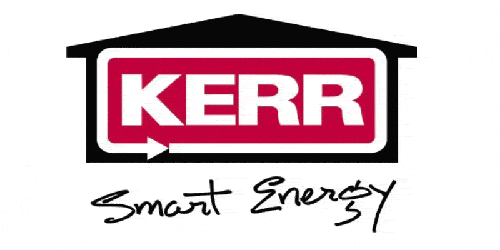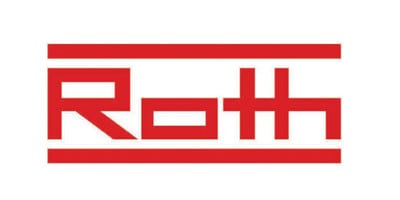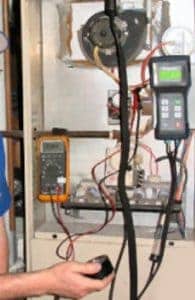Oil Heating
The new oil furnaces and boilers can save you operating costs over your older, less efficient systems. Newer oil fired systems can be up to 40% more efficient than ones made just a few decades ago.
Oil heat minimizes the chances of carbon monoxide poisoning and is non-explosive. It is highly recommended to have your oil furnace and boiler cleaned and serviced by a professional technician every year.
Oil burning technology has made great strides with low emission burners, microprocessor controls, and flame retention heads. These improvements allow the burners to operate extremely quiet, without the odour or soot typically associated with older oil fired equipment. The U.S. Environmental Protection Agency confirms that there is little difference between particulates from burning natural gas or oil fired equipment.
Oil Fired Forced Air Furnaces
For many years, oil fired forced air furnaces were the dominant heat provider for homes and businesses in the rural areas. Oil was, and still is, the lowest cost fuel option (besides wood if available) to heat your home.
The technicians at Hayter Plumbing & Heating Ltd. have installed many oil fired furnaces, but none quite like Kerr’s for the unmatched quality and performance of its high efficiency oil furnaces and boilers. Kerr has been providing families with proven performance for many years and, above all, it’s a Canadian company. The Kerr lineup has an oil fired forced air or wood/oil furnace that is suited for almost any situation. With its unique “Quick Heat” chamber-free technology, Kerr is leading the way with its philosophy to design products that don’t follow others. Kerr’s oil furnaces and boilers are still charting the course for heating innovation.
Our decision to offer, install, and most importantly stock parts for the Kerr Heating Products was due to its strong reputation for service and its ability to grow and adapt to its customers’ needs. Kerr proves it stands behind its product by leading the industry with its Limited Lifetime Warranty on the heat exchanger and cabinet. Combine Hayter’s service and parts availability with Kerr Heating furnaces and boilers and you have the ‘ideal’ forced air oil fired heating system.


Oil Fired Boilers
Boilers have made a big comeback in today’s modern lifestyle. The need for greater comfort, higher output demands, and more luxuries dominate new home and renovation projects. Commercial buildings have utilized boilers for years for their practicality, operating costs, and comfort level. Replacement high efficiency oil fired boilers allow you to adapt to existing water or steam piping systems with little to no changes required. Operating costs for new boilers are substantially lower and much cleaner than older outdated systems. Several heat delivery systems exist for boilers that are not available with forced air systems.


Direct Vent Systems
Direct-vent oil furnaces and boilers are your best choice when your existing chimney does not meet code; or if its deteriorating condition will be too costly. Other applications for direct vent systems exist when conventional ‘up the chimney’ venting is not available or you require a sealed combustion system.
Chimney Materials & Sizing
Once The Hayter Group has determined the proper size of your required heating system, the size of your masonry or metal chimney must be selected (unless you want the direct vent system). If you have an existing chimney, the size of the flue diameter must match your heating system input. If the existing chimney is too large, a chimney liner (flexible or rigid stainless steel) can be installed.
Insulated stainless steel chimneys are readily available with little maintenance. These chimneys are installed by The Hayter Group with proper code requirements.
Oil Tanks
There has been some dramatic improvements in oil tanks. Roth double-wall tanks are designed to offer the highest level of environmental protection. Every inner Roth tank is made out of blow-molded, high-density polyethylene that is seamless, absolutely leak-proof and corrosion-resistant. The outer tank is made of lead-proof corrosion resistant steel which is capable of containing at least 110% of the capacity of the inner tank for maximum protection.
The Hayter Group also installs Canadian-made Granby EcoGard double bottom oil tanks.


Oil Burner Inspections and Certifications
If you currently have an oil heating system, you should have received a notice that explains what is involved with ‘Fuel Oil Inspections’- a mandatory inspection for all oil heat customers. Oil furnaces and boilers, components and equipment, together with the installation, servicing and supplying of oil, are strictly regulated by the government to ensure that minimum standards and practices are met to protect the public and the environment. All natural gas, propane, and oil fired equipment are now strictly governed by a set of legal requirements. As of June 27, 2001 the Technical Standards and Safety Act strictly regulates the code and adoptions made to it.
The oil tank must meet the requirements set out by the Fuel Oil Code. If a tank has been inspected but does not have a ‘green tag’ on it, your fuel supplier can refuse to fill your tank. The certification and “green tagging” are done by licensed oil burner technicians. The Hayter Group can complete your required inspections in Southwestern Ontario.
If a new tank is required a replacement can be installed above ground outside or inside a building or basement. A tank that is installed outside is certified for 15 years and indoor installations are certified for 20 years. All new tank installations must now be a minimum of ‘double-bottom’ or ‘double-walled’ tanks. Older oil tanks are prone to leaks and your insurance company can demand you change your tank or heating system in order to be insured.
Your existing oil furnace and boiler or water heater must meet the code requirements. This usually involves two and a half to three hours of cleaning, inspecting, and testing. The final component of your Oil Fired Certification is the chimney. Your chimney must meet the code requirements regarding height, size, material, condition, and location.
If your oil fired heating system is acceptable your certification is valid for 10 years; however, yearly cleaning is strongly recommended for all oil furnaces and boilers – a dirty oil fired system can cost you up to 30% more to heat than a clean one!



